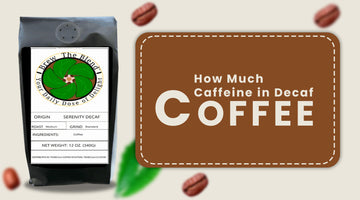How Much Caffeine in Decaf Coffee

Often marketed as caffeine-free decaf coffee, it is an alternative to regular coffee, but how "caffeine-free" is it? Contrary to popular belief, decaf coffee is not entirely caffeine-free; it's a low-caffeine coffee. Small traces remain while it undergoes processes to remove most of the stimulant.
In this blog, we’ll explore what does decaffeinated means, whether decaf have has caffeine, what factors affecting its content, and what you should know about decaffeination processes and health implications.
What Is Decaf Coffee?

Decaf coffee refers to coffee that has most of its caffeine removed. To simplify your understanding, this means at least 97% of the caffeine is eliminated during decaffeination.
The amount of caffeine in decaf coffee varies depending on the type of bean used and the method employed to extract it.
Decaffeination Process
The decaffeination processes generally involve soaking or steaming unroasted coffee beans to open their pores and remove caffeine using one of three primary methods:
Solvent-Based Process
The Solvent-based process combines water with methylene chloride or ethyl acetate to dissolve and extract caffeine. These chemicals evaporate entirely, leaving no residue in the final product.
The Solvent-based process combines water with methylene chloride or ethyl acetate to dissolve and extract caffeine. These chemicals evaporate entirely, leaving no residue in the final product.
Swiss Water Process
The Swiss water process is the only organic method of decaffeination. It uses osmosis to extract caffeine, gently ensuring a 99.9% caffeine-free product.
Carbon Dioxide Process
The Carbon Dioxide process is the newest method, which employs carbon dioxide to target and remove caffeine while preserving the coffee’s other flavor compounds. Though effective, it is also one of the more expensive options.
Regardless of the method used, decaf coffee often has a milder taste and aroma than regular coffee due to the processing involved.
Also Read: How Long Do Coffee Beans Last? Storage Tips for Freshness
How much caffeine is in decaf coffee?
Though significantly reduced, decaf coffee still contains small amounts of caffeine. Continue reading to learn more about how much caffeine is in decaf coffee/ How much caffeine in one cup of decaf coffee:
- An 8-ounce (236-ml) cup of decaf coffee typically contains up to 7 mg of caffeine, while a regular cup contains between 70 and 140 mg.
- A single 16-ounce (473-ml) serving of decaf from popular coffee chains can contain anywhere from 8.6 to 13.9 mg of caffeine.
- Instant decaf coffee generally has even lower caffeine levels, with 3–8 mg per serving, depending on the size.
These seemingly small amounts can still add up, especially for those who consume multiple cups daily or are particularly sensitive to caffeine. If you’re monitoring your intake closely, it’s worth checking the specific caffeine content of your preferred decaf brand.
Factors Influencing the Amount of Caffeine in Decaf Coffee
The caffeine content in decaf coffee can depend on several factors:
1. Brand Variations: Different brands use different decaffeination methods, leading to slight differences in caffeine levels. However, these differences are generally negligible.
2. Brewing Method: Higher temperatures, smaller grinds, and longer brew times can slightly increase caffeine extraction, though this effect is more significant for regular coffee.
3. Serving Size: Larger servings naturally contain more caffeine content. For instance, store-bought decaf coffees typically range from zero to five milligrams of caffeine per cup, while some coffee shop servings may contain up to 10 milligrams or more.
Benefits of Drinking Decaf Coffee

1. Lower Caffeine Content
Decaf coffee is perfect for people who want to limit caffeine intake due to pregnancy, sensitivity, or health reasons. It provides the coffee experience without the jitters or sleep disturbances.
2. Anti-Inflammatory Properties
It retains the antioxidants found in regular coffee, making it an anti-inflammatory beverage without the stress response that caffeine can trigger.
3. Gut Health Support
Both regular and decaf coffee can promote colon activity, aiding digestion. Some studies link coffee consumption to a reduced risk of colorectal cancer.
Also Read: How many scoops of coffee per cup
Drawbacks of Decaf Coffee
Trace Caffeine Levels
While decaf has significantly less caffeine, it’s not entirely caffeine-free. Individuals susceptible to caffeine should be cautious.
Decaffeination Concerns
Some decaffeination processes use chemicals like methylene chloride, which has raised potential health concerns. Opting for coffees processed using Swiss Water or CO2 can alleviate these worries.
Best Decaf Coffee Concentrate
Decaf coffee concentrate offers a quick, flavorful alternative for busy coffee lovers. Made from high-quality decaffeinated beans, it's perfect for those who want the rich taste of coffee without the caffeine.
The best decaf coffee concentrate often uses methods like cold brewing or the Swiss Water Process to maintain flavor and minimize caffeine.
Look for concentrates that are easy to use, with smooth, balanced flavors and ultra-low caffeine levels.
Decaf vs. Regular Coffee Caffeine
Regular coffee contains 70-140 mg of caffeine per 8-ounce cup, providing a stimulating boost. In contrast, decaf coffee typically has around 7 mg per cup.
While decaf is a gentler option, it still contains caffeine. For those sensitive to caffeine, decaf is a great choice, though it may have a milder taste.
Decaffeination can slightly alter the flavor, but high-quality decaf still delivers a rich, enjoyable experience with minimal caffeine intake.
Conclusion
Decaf coffee, with its rich and bold taste, is a fantastic option for those who want to enjoy coffee without the caffeine buzz. While it's not entirely caffeine-free, its low levels suit most individuals, offering the same great taste without the jitters. So, while the answer to whether decaf coffee has caffeine is no, it's important to remember that it's not entirely caffeine-free.
Understanding does decaf have caffeine the caffeine content of decaf coffee, choosing the right brands, and mastering brewing techniques are key to confidently enjoying your cup of decaf coffee, ensuring you get the taste you love with the caffeine levels you prefer.
If you enjoy our content, visit our blog section. We cover facts, truths, and myths about coffee that you may find helpful while enjoying our Brew the Blend coffee.
FAQs
1. Is decaf coffee high in caffeine?
No, decaf coffee is not high in caffeine. It typically contains 2-5 milligrams of caffeine per cup, far less than the average of 95 milligrams in regular coffee.
2. Is decaf coffee still a stimulant?
Yes. Due to its trace caffeine content, decaf coffee can still act as a mild stimulant, but its effects are significantly weaker than regular coffee.
3. Will decaf coffee keep you awake?
Unlikely. The minimal caffeine in decaf coffee typically won't disturb your sleep unless you are extremely sensitive to caffeine.
4. Can you drink decaf coffee while pregnant?
Yes. Decaf coffee is generally safe during pregnancy as it contains very low caffeine levels, but consult your doctor for specific guidance.
5. Which decaffeinated coffee has the least caffeine?
Store-bought decaf coffee, like our Serenity Decaf, often has the least caffeine, with 0-5 milligrams per cup.





